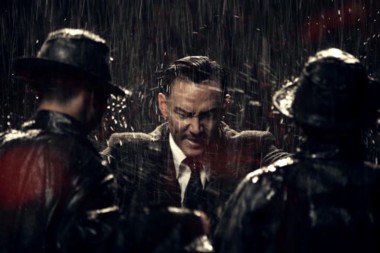You don’t have to be a fan of kung fu films to know about Bruce Lee. The iconic actor, gone now for four decades, probably did more to popularize the genre than just about anyone, and while his films may not seem as artistically fussed-over as some of those they inspired, they remain some of the most sturdy templates for the form—seminal stories that new filmmakers still return to in order to craft variations on Lee’s themes.
But while Lee may have seemed to come from nowhere to Western audiences, his fighting style was the product of a long study. This week, a new film from acclaimed director Wong Kar Wai (In the Mood for Love; Chungking Express) comes to area screens to tell the story of Ip Man, a Wing Chun master who became the man who would train Bruce Lee.
The Grandmaster—its title evoking not only Ip Man’s physical skill and standing in the martial arts world, but also the intense mental acuity often associated with high-level chess—reunites Wong with stars Tony Leung and Ziyi Zhang as Ip Man and Gong Er, the master and the daughter of a respected rival who becomes a lifelong acquaintance of Ip Man. Their relationship, however, is interrupted by the tumultuous history they had the fortune to live through: the era following the fall of China’s last dynasty was both a golden age of martial arts and a time of deep divisions and internal chaos.
As a young man, Ip devoted himself to his art, never needing to concern himself with work or teaching thanks to family wealth. But after the Japanese invasion of Foshan, Ip Man’s family is forced into poverty and hardship; eventually he has no choice but to flee the country. Settling in Hong Kong, Ip turns to teaching to earn a living, bringing his once marginal style of Wing Chun into the mainstream; it was also in Hong Kong that he would come to meet his most famous student, and come to leave a lasting mark on cultures far from his own shores. Today, Wing Chun remains one of the world’s most practiced martial arts.
Helping Wong with the visuals is renowned choreographer Yuen Wo Ping (Crouching Tiger, Hidden Dragon), who puts all of Leung and Ziyi’s training to great use. But if The Grandmaster could rightly be called a kung fu movie, it is also about something more than those balletic battles. (Fans of the film may also enjoy comparing it to the Ip Man series of films starring Donnie Yen; they are available to stream via Netflix.) It is about history and tradition in the face of changing times, and about one man’s devotion, not just to a fighting style, but to a deeper sense of self. For that sense of reflection, often missing in movies about martial arts, Wong’s directorial style—rich, sumptuous, yet reserved—proves a perfect fit.
Also this week: One of the casualties of the closing of Pleasant Street Theater was the popular Midnight Movies series, which tended to feature oddball movies that would never garner a regular run: things like the gothic Italian horror of Suspiria or the self-explanatory Hobo With a Shotgun. Now, Amherst Cinema’s General Manager George Myers—who ran the series at PST—is bringing it back. Beginning Aug. 30, the Amherst house will begin a new series of “Late Nite” screenings every Friday night at 10 p.m. (the earlier start helps accommodate those using the bus lines to get home).
The new series will debut with a film that initially showed (twice!) as part of the Pleasant Street series: Tommy Wiseau’s The Room. Described in this space as “either one of the worst movies ever made or one of the craziest, most deadpan black comedies in the history of film,” the film is a cult classic that has become a Rocky Horror for a new age. In the coming weeks, Myers and company will bring in a wide selection of features, from mainstream hits like Men in Black to the just-give-in-and-roll-with-it narrative of the R. Kelly Trapped in the Closet Sing-Along, a 33-chapter music video opus in which the singer has a one-night stand that snowballs into an insanely complicated and sometimes hilarious web of deceit, cliffhangers, and turnarounds. You’ll never look at your closet door the same way again.•
Jack Brown can be reached at cinemadope@gmail.com.



